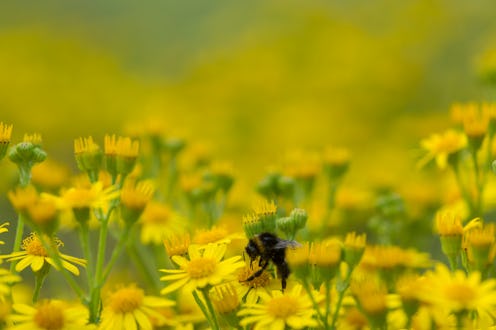Life
Sorry, Friends, But This Is How Much Longer Allergy Season Is Here To Stay

Allergy season sucks. There's no two ways about it. And what's worse is that allergy season hits right as winter tapers off, which means that those of us with seasonal allergies start experiencing the worst symptoms right around the time the warm springtime air hits, tempting us into going outside. Unfortunately for folks hoping to wait out allergy season so they can enjoy the incoming summer sunshine, I've got some bad news: Allergy season is far from over.
While we usually correlate allergy season and springtime, since symptoms begin appearing in the spring, it turns out the dreaded pollen season actually lasts all the way till the fall, according to Dr. Maria Castells, an allergist and immunologist at Brigham and Women’s Hospital. She told Boston.com, "There is a continuum of a pollen season that starts in the beginning of the spring till the fall."
Castells explained that different plants release pollen at different times throughout the season. Pollen season, and thus allergy season, begins with trees releasing pollen at the end of March or the beginning of April, she told Boston.com. Trees' pollen release is followed by grasses releasing their pollen (which Castells said happens from May to July), and each season we see "weeds rounding out the year by releasing [...] tiny irritants in the fall," Boston.com reported.
The reason some people may see their own allergy symptoms tapering off in the summer is because people aren't always allergic to every type of pollen. According to Everyday Health, people can be allergic to, for example, tree pollen, but not be allergic to grass pollen, or be allergic to grass pollen but not tree pollen. Everyday Health does explain that if you're allergic to the pollen of one type of grass, you're likely allergic to all grass pollens, though. But being allergic to just one type of pollen is better than being allergic to all of them — because folks who are allergic to all of them get the full brunt of the complete allergy season, from spring to fall.
Castells told Boston.com that it's useful for allergy sufferers to know which types of pollen they're allergic to. If you're not sure, you can of course contact your healthcare provider for testing, but you can also get a rough estimate by noting when your symptoms wax and wane.
"Once one knows ‘what are the specific allergies,’ [they will be] much better prepared for taking the medication that’s pointing to the forecast," she told Boston.com.
She also had some tips for handling allergy season — either all or part of it. She told Boston.com the "'most dangerous time of the day' is early morning, so during high pollen season allergy sufferers should plan any outdoor activities or exercise in the afternoon — around 5 or 6 p.m. — when the pollen is settling."
And for those of us who are dying for some fresh air after a winter of being cooped up, we're going to have to hang on just a little longer, Castells explained. "I know that’s hard now that we’ve had a long winter, we’d love to have a little bit of air in the bedrooms, but that’s kind of dangerous because all the pollen grains starting at 4 and 5 a.m. start to come inside the bedrooms and start to inflame the nose, the eyes, the throat, the lungs," she explained to Boston.com. "Then when people wake up in the morning they start to cough, they start to feel like they can’t really sleep well, sneezing, and not being able to breathe through their noses."
If you do have to go outside during high pollen times, there are also measures you should take, Dr. Ronald Saff, Fellow of the American Academy of Allergy Asthma and Immunology at the Allergy and Asthma Diagnostic Treatment Center, told The Cut. He advised that people with allergies take showers if they've been outside, to avoid bringing pollen into their homes.
While allergy season is miserable for all people with allergies, if you're feeling like your methods of minimizing your symptoms aren't working, you should talk to your healthcare provider. Saff told The Cut that in his view, the most effective medications for treating allergies are nasal sprays. "They spray right into the nose and sinuses, which is the area allergies take place, so they're very targeted," he explained.
Saff added that using a combo of over-the-counter steroid nasal spray and an antihistamine product (like Claritin or Zyrtec) is a good bet. "But you can also get allergy shots in your arms over a period of around four years, which Saff recommends as a long-term solution," The Cut reported.
Allergy season might be gearing up to kick our butts for another few months, but at the very least, we can take some comfort in knowing that, as always, it will end. Eventually.